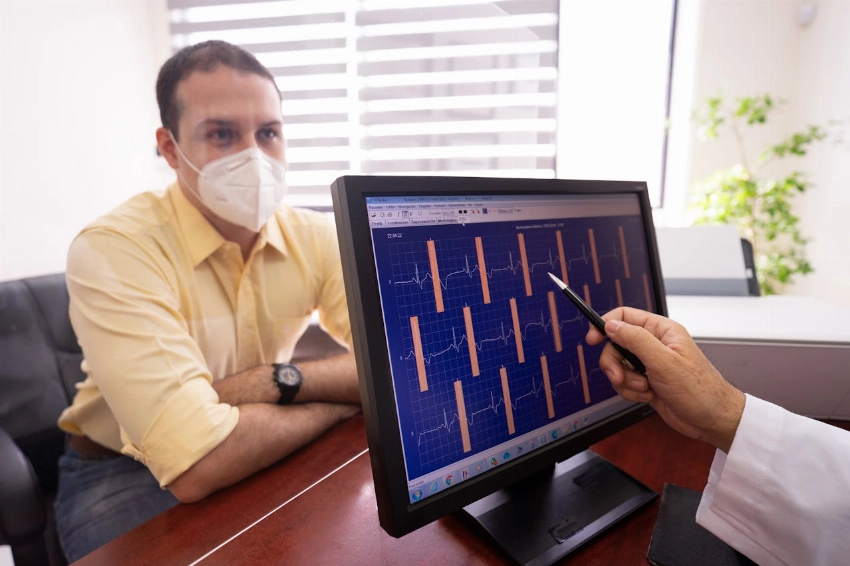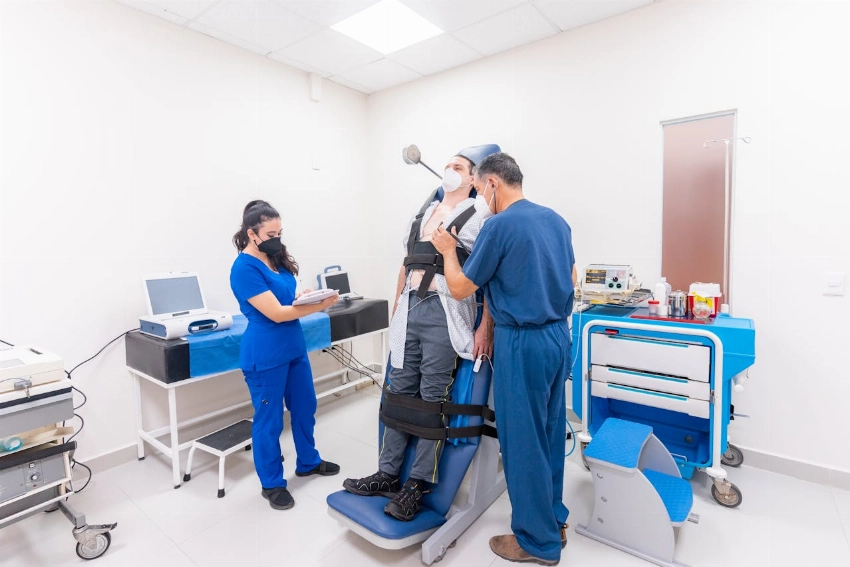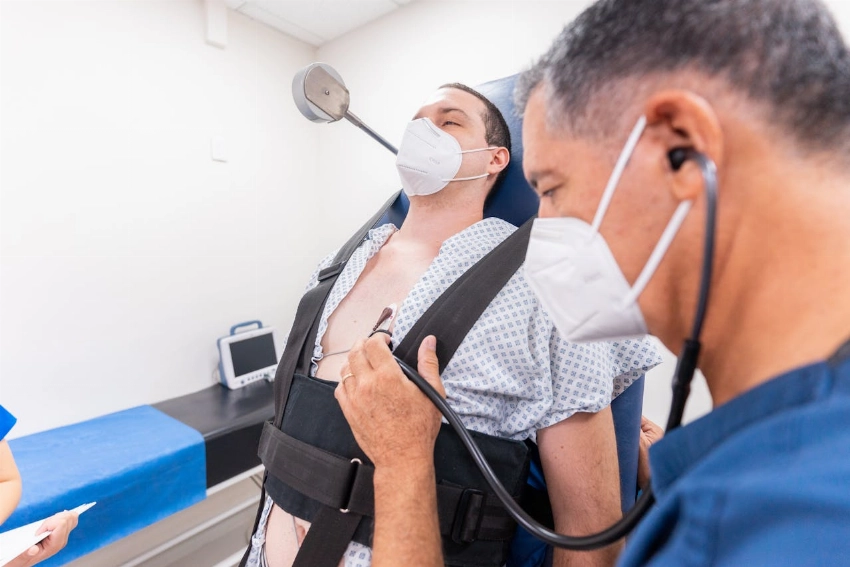Key Highlights
- What is the Cardiologist's Salary in Germany for Indians in 2025?
- What is the Average Cardiologist Salary in Germany in 2025?
- What Factors Influence Cardiologist Salaries in Germany for Indians in 2025?
- How Much Do Cardiologists Earn at Different Career Stages in Germany in 2025?
- What Additional Benefits Do Cardiologists Receive Beyond Base Salary in Germany?
- How Does a Cardiologist Salary in Germany Compare Internationally?
- What Are the Highest Paying Cardiology Subspecialties in Germany?
- How Can Cardiologists Maximise Their Earning Potential in Germany?
- What is the Tax Impact on Cardiologist Take-Home Pay in Germany?
- What Are the Licensing Requirements for International Cardiologists in 2025?
- What Does the Future Hold for Cardiologist Salaries in Germany?
- How Do German Cardiology Jobs Offer Work-Life Balance?
- Conclusion
The German health care market is advantageous in terms of cardiologist salary in germany and other health care specialists. It is an immensely attractive place for healthcare specialists from all over the world. The cardiologist's salary in germany varies between INR 172,200 and INR 256,425 per annum, which means the cardiologist's income in germany per month is approximately INR 14,350 TO INR 21,368, depending on experience and speciality.
What is the Cardiologist's Salary in Germany for Indians in 2025?

-
The cardiologist's salary in Germany in 2025 is usually between EUR166,420 and EUR339,250 a year, with an average of about EUR256,425 per year.
-
The average salary of a cardiologist in Germany per month amounts to around EUR14,350 to EUR21,368 or more, depending on experience, employer, and location.
-
An entry-level cardiologist might earn anywhere in the ballpark of EUR100,000 to EUR120,000 per annum, while a specialist with more experience might earn as much as EUR339,250 or more per annum.
-
For professionals in high-demand roles, the average salary of a cardiologist in Germany ranges from EUR100,000 to EUR200,000 per year, particularly in prestigious hospitals and clinics.
-
The highest interventional cardiologist salary in Germany is greater, ranging from EUR207,800 to EUR318,800 per year, which could increase to above EUR400,000 for experienced professionals in leading hospitals who specialise in particular interventional cardiologist procedures.
Also Read: Doctor Salary in Germany: Latest Pay & Future Trends
What is the Average Cardiologist Salary in Germany in 2025?
The average salary of a cardiologist in germany in 2025 averages between INR 183,700 and INR 256,425 per year, depending on the dataset, seniority, and employer type.
|
Metric |
General Cardiology (Germany 2025) |
|
Mean annual salary |
INR 256,425 |
|
Median/typical annual level |
~INR 183,700 |
|
Typical salary range |
INR 166,420–INR 339,250 |
|
Monthly gross (est.) |
INR 14,350–INR 21,368 |
|
Hourly gross (est.) |
~INR 120–INR 125/hour |
Monthly and Yearly Breakdown of Cardiologist Earnings in Germany
For a cardiologist's monthly salary, gross earnings generally fall between about INR 14,350 and INR 21,368. At the same time, net take-home varies with tax class, state, health insurance, and social contributions that can reach roughly 38–45% at higher incomes.
|
Scenario (illustrative) |
Annual gross |
Monthly Gross |
Est. Deductions % |
Est. Net Monthly |
Typical Bonuses |
Total Comp Note |
|
Entry-level specialist |
INR 100,000–INR 120,000 |
INR 8,333–INR 10,000 |
~35–42% |
~INR 4,800–INR 6,500 |
5–10% of base |
Base + on-call/bonus |
|
Mid-career consultant |
INR 183,700–INR 256,425 |
INR 15,308–INR 21,368 |
~38–45% |
~INR 8,400–INR 13,200 |
5–15% of base |
Base + allowances/bonus |
|
Senior/lead (non-interventional) |
INR 250,000–INR 339,250 |
INR 20,833–INR 28,271 |
~40–46% |
~INR 11,300–INR 16,900 |
10–15% of base |
Base + leadership/on-call |
How Does General Cardiology Compare to Interventional Cardiology in Germany?
The interventional cardiologist salary in Germany typically exceeds general cardiology, with common ranges around INR 207,800–INR 318,800 and top earners surpassing INR 400,000 in high-volume centres, reflecting additional fellowship training, on-call intensity, and strong procedural demand.
|
Aspect |
General Cardiology |
Interventional Cardiology |
|
Core role |
Non-invasive diagnosis, medical therapy, and preventive care |
Invasive catheter-based diagnostics and PCI/stenting |
|
Typical training |
Internal medicine + cardiology residency |
Additional interventional fellowship and cath-lab training |
|
Mean annual salary |
~INR 183,700–INR 256,425 |
~INR 207,800–INR 318,800+ |
|
Typical salary range |
~INR 166,420–INR 339,250 |
Often INR 200,000–INR 400,000+, centre-dependent |
|
Monthly gross (est.) |
~INR 14,350–INR 21,368 |
~INR 17,300–INR 26,600+, top earners higher |
|
On-call/bonus intensity |
Moderate; outpatient and ward duties |
High procedures, cath-lab call, performance pay |
|
Demand factors |
Stable demand across hospitals/clinics |
High demand for procedural expertise and acute care coverage |
What Factors Influence Cardiologist Salaries in Germany for Indians in 2025?

Factors influencing cardiologist Salaries in Germany are as follows:
-
Experience and Seniority: step-based raises under public hospital contracts and progression to Oberarzt/Chefarzt levels significantly lift the cardiologist's salary in Germany per month and expand responsibilities.
-
Specialisation: invasive/procedural work boosts the interventional cardiologist's salary in Germany above non-invasive general cardiology due to cath-lab duties, risk, and higher procedural demand.
-
Geographic Location: large cities (e.g., Munich, Berlin, Frankfurt) tend to pay more than rural or eastern regions, so the salary of a cardiologist in Germany varies by local demand and living costs.
-
Hospital Type and Sector: university/municipal hospitals follow transparent pay scales, while private hospitals can offer higher, more variable packages that shift the cardiologist's salary in Germany beyond standard bands.
-
Private Practice vs Employment: self-employed or partnership models can out-earn salaried roles through procedure billing and patient volume, lifting cardiologist salary in germany above typical employed ranges.
-
Academic and Leadership Roles: teaching, research profiles, and department leadership (e.g., chief physician) command the upper tiers, increasing the average salary of a cardiologist in Germany at senior levels.
How Does Experience Level Impact Earning Potential as a Cardiologist in Germany?
The impact of experience level on earning potential is as follows:.
|
Experience Bracket |
Rank Alignment |
Typical Annual Gross (general) |
Typical Annual Gross (interventional) |
Step Change vs Prior |
Notes |
|
0–2 years |
Assistenzarzt |
INR 60,000–INR 80,000 |
INR 65,000–INR 85,000 |
baseline |
Public scales; supervised duties |
|
2–5 years |
Assistenzarzt→Facharzt |
INR 80,000–INR 110,000 |
INR 90,000–INR 120,000 |
~+25–35% |
Board exam boosts pay |
|
5–10 years |
Facharzt |
INR 120,000–INR 180,000 |
INR 150,000–INR 220,000 |
~+30–40% |
Higher autonomy/on-call |
|
10–15 years |
Oberarzt |
INR 180,000–INR 240,000 |
INR 220,000–INR 320,000 |
~+20–30% |
Consultant leadership pay |
|
15–20 years |
Senior Oberarzt |
INR 220,000–INR 300,000 |
INR 260,000–INR 380,000 |
~+15–25% |
Performance/allowance add-ons |
|
20+ years |
Chefarzt |
INR 300,000–INR 400,000+ |
INR 350,000–INR 450,000+ |
~+20%+ |
Department head contracts |
Which German Cities Pay Cardiologists the Highest Salaries in 2025?
German cities pay cardiologists the highest salaries, as follows:
|
City |
Salary Tendency (General) |
Salary Tendency (Interventional) |
Cost of Living Tendency |
Real Income Tendency |
|
Munich |
High |
High–Very High |
Very High |
Medium |
|
Frankfurt |
High |
High–Very High |
High |
Medium |
|
Stuttgart |
High |
High |
High |
Medium |
|
Hamburg |
Moderately High |
High |
High |
Medium |
|
Berlin |
Moderate–High |
High (tertiary centres) |
Moderate–High |
Medium–High |
|
Cologne |
Moderate–High |
High (invasive roles) |
Moderate–High |
Medium |
|
Düsseldorf |
Moderate–High |
High |
High |
Medium |
|
Hanover |
Moderate |
Moderate–High |
Moderate |
Medium–High |
|
Leipzig |
Moderate |
Moderate |
Moderate |
Medium–High |
|
Dresden |
Moderate |
Moderate |
Moderate |
Medium–High |
Does Hospital Type (Private vs Public) Affect Compensation in Germany?
Hospital type does affect compensation, with public and university hospitals paying by collective agreements while private hospitals and private practice offer more variable, often higher, packages for cardiologists in Germany.
-
Public hospitals and university hospitals follow collective agreements (Tarifverträge) with transparent pay steps, creating a predictable progression for the cardiologists salary in Germany and a steady cardiologists salary in germany benchmarks across seniority tiers.
-
University hospitals mirror public scales but may add allowances for on-call, teaching, and research, so the salary of a cardiologist in Germany at these centres can include supplements without deviating far from standard bands.
-
Private hospitals negotiate individual contracts with room for performance bonuses and higher ceilings—particularly valuable for cath-lab output—often lifting the interventional cardiologist salary in Germany above comparable public roles.
-
Private practice/self-employment ties earnings to patient volume and procedures, allowing experienced cardiologists to surpass employed ranges, though monthly variability means the cardiologist salary in germany per month can fluctuate with case mix and payer mix.
-
Interventional cardiologists generally earn more across all settings due to procedural complexity and call intensity, with city data (e.g., Cologne and Berlin) showing higher invasive pay bands relative to general cardiology in the same hospitals.
Also Read: Cardiologist Salary Australia: Pay, Growth & Trends
How Much Do Cardiologists Earn at Different Career Stages in Germany in 2025?
Cardiologists earn at different career stages are as follows:
-
Years 1–3 (Assistenzarzt): Entry on public hospital scales at about INR 60,000–INR 80,000 annually, setting the baseline for cardiologist salary in Germany per month before speciality board certification and cath-lab exposure raise compensation bands.
-
Years 4–6 (Assistenzarzt → Facharzt): Step increases and Facharzt status lift annual ranges to roughly INR 80,000–INR 110,000 in general cardiology, while early cath-lab exposure can nudge interventional totals toward INR 90,000–INR 120,000
-
Years 7–10 (Facharzt): Consolidation years with general bands around INR 120,000–INR 180,000 and interventional INR 150,000–INR 220,000 as procedure volume, on-call, and allowances expand the salary of a cardiologist in Germany.
-
Years 11–15 (Oberarzt): Consultant leadership drives annuals to about INR 180,000–INR 240,000 (general) and INR 220,000–INR 320,000 (interventional), with monthly equivalents reflecting the cardiologist salaries in Germany per month in high five-figures.
-
Years 16–20 (Senior Oberarzt): Advanced responsibilities and performance pay lift general to ~INR 220,000–INR 300,000 and interventional to ~INR 260,000–INR 380,000, widening gaps between subspecialties and institutions.
-
Years 20+ (Chefarzt): Department-head contracts frequently exceed INR 300,000–INR 400,000+ in general and INR 350,000–INR 450,000+ in interventional, reflecting market leadership and individualised agreements within the cardiologists' salary in Germany.
What Do Entry-Level Cardiologists Earn in Germany?
The entry-level cardiologists earn the following in Germany:
-
Residents (Assistenzarzt) begin on transparent public scales at roughly INR 60,000–INR 80,000 annually, with structured step-ups and allowances shaping the cardiologist salary in Germany per month during supervised training.
-
Newly qualified specialists (Facharzt) typically earn around INR 120,000 annually in general roles, with interventional starters earning more due to cath-lab duties and on-call supplements that elevate the average salary of a cardiologist in Germany early on.
-
Monthly gross for early-career specialists typically lands in the INR 10,000–INR 15,000 range, depending on employer type, region, and workload, mirroring national specialist benchmarks for cardiologists' salaries in Germany per month.
-
Early interventional tracks typically out-earn non-invasive peers due to higher procedure intensity and cath-lab coverage needs, sustaining a premium in interventional cardiologists' salaries in Germany from the outset.
What Are Senior Cardiologists and Chief Physicians' Salaries in Germany?
The senior cardiologist and chief physician salaries are:
-
Oberarzt (consultant) cardiologists in general practice often earn INR 180,000–INR 240,000, while interventional counterparts reach INR 220,000–INR 320,000 with additional pay from procedures and call intensity.
-
Senior Oberarzt roles expand leadership and programmatic duties, elevating general bands to ~INR 220,000–INR 300,000 and interventional to ~INR 260,000–INR 380,000, with variable bonuses linked to departmental metrics.
-
Chefarzt (chief physician) contracts are individually negotiated, typically exceeding INR 300,000–INR 400,000+ (general) and INR 350,000–INR 450,000+ (interventional cardiologist salaries in Germany), including base, performance bonuses, and premium allowances.
-
Private hospitals can layer performance-linked components and negotiated ceilings above public-scale comparators, widening dispersion at senior levels within cardiologist salaries in Germany.
-
At these senior tiers, monthly gross often reaches the high-five to low-six-figure band, consistent with the upper-range cardiologist salary in Germany per month for leaders and high-volume interventional specialists.
What Additional Benefits Do Cardiologists Receive Beyond Base Salary in Germany?

The cardiologist's salary in Germany includes pensions, insurance, allowances, paid leave, and performance incentives that materially raise total compensation beyond base pay.
-
Statutory social insurance plus supplementary employer pension (Betriebsrente) is standard, with public/university hospitals following collective agreements that bundle retirement, health, accident, and long-term care coverage into standardised packages, providing predictable value-adds for cardiologist salaries in Germany.
-
Performance incentives and on-call/shift allowances frequently add approximately 5% to 15% increase in annual earnings for specialists, with interventional cardiologists in Germany benefiting the most due to cath-lab throughput, night/weekend coverage, and case complexity.
-
Professional development support typically includes CME days, conference budgets, and course fees, with university hospitals additionally recognising teaching/research outputs via protected time or small publication/teaching stipends that enhance the average salary of a cardiologist in Germany in total comp terms.
-
Paid leave is generous by international standards (commonly ~28–30 days), alongside paid public holidays and time-off for education, which increases the realised value of the cardiologists salary in germany when accounting for work–life balance.
-
Net take-home depends on tax class, state, and insurance; high-income specialists often retain roughly 55% 62%of gross, so an INR 20,000 cardiologist salary in germany per month gross could net around INR 11,000–INR 12,400 depending on deductions and benefits-in-kind.
Also Read: Physiotherapist Salary in Germany: New Pay, Scope & More
How Does a Cardiologist Salary in Germany Compare Internationally?
The cardiologist's salary in Germany generally sits below Switzerland and the USA, comparable to the Netherlands and Austria, and above the UK on typical gross scales, with purchasing power shaped by taxation and living costs across markets.
|
Country |
Typical Specialist Gross (Cardiology) |
PPP/Net Positioning vs Germany |
Cost of Living/Tax Context |
Migration Trend Notes |
|
Germany |
~INR 183,700–INR 256,425; higher for interventional roles |
Strong net within EU peers; mid-to-high social contributions |
Moderate–High in major cities; public benefits offset costs |
Attracts EU/non-EU specialists; language B2/C1 needed |
|
Switzerland |
Higher than Germany at most seniority tiers |
Robust net despite taxes; PPP often superior |
Very High; still favourable take-home for specialists |
Popular destination for higher pay/PPP |
|
USA |
Often higher gross than in Germany for cardiologists |
High gross; net varies by state and practice costs |
High in major metros; variable insurance/overheads |
Draws specialists for top-end compensation |
|
UK |
Lower than Germany (NHS banding constraints) |
Lower net; standardised public scales limit upside |
High in London/SE; benefits via NHS |
Outflows to EU/CH for higher pay |
|
Austria |
Similar/slightly lower than Germany |
Comparable net; similar tax/benefits structure |
Moderate–High in Vienna/urban hubs |
Cross-border mobility with Germany |
|
Netherlands |
Broadly similar to Germany |
Comparable net with progressive taxes |
High in the Randstad corridor |
Stable demand for specialists |
|
Canada |
Similar or slightly lower than Germany |
Net moderated by taxes; regional variability |
High in Toronto/Vancouver |
Lifestyle-driven moves; pathways can be long |
|
Australia |
Similar to slightly higher in some subspecialties |
Good net; high costs in Sydney/Melbourne |
High in major cities; strong quality-of-life factors |
Popular for work–life balance |
Germany vs Switzerland: Where Do Cardiologists Earn More in 2025?
Cardiologists earn more as follows:
-
Switzerland generally pays more at all seniority tiers. Hence, an interventional cardiologist's salary in Germany is usually lower than that of their Swiss counterparts, even after adjusting for the cost of living.
-
Purchasing power parity tends to favour Switzerland for senior consultants and chiefs. At the same time, Germany offers more substantial value at earlier stages due to structured training and public benefits stabilising the average salary of a cardiologist in Germany.
-
Monthly earnings are typically higher in Switzerland; however, Germany’s comprehensive benefits and predictable public scales support consistent salaries for cardiologists in Germany, ensuring stable monthly trajectories during training to consultant transition.
-
Lifestyle trade-offs include Switzerland’s higher costs and potentially greater earning volatility in private settings versus Germany’s transparent Tarifverträge and academic pathways, which can be attractive for research-oriented clinicians.
-
For cardiologists prioritising peak income, Switzerland leads; for balanced career development with stable progression, Germany remains competitive across general and interventional tracks within Europe.
Germany vs USA: Cardiologist Salary Comparison
U.S. cardiologists generally earn more in gross terms than their peers in Germany, while Germany offers more predictable, benefits-rich packages and standardised progression for specialists.
-
Average U.S. cardiology pay is about $451,140, compared with an average cardiologist salary in Germany of INR 256,425, underscoring a sizable gross pay gap.
-
Every month, the cardiologist's salary in Germany is roughly INR 14,350–INR 21,368, which trails U.S. monthly equivalents implied by $423k–$451k annual figures.
-
Germany’s public/university hospitals use collective agreements for predictable step raises, whereas U.S. compensation varies widely by employer, region, and contract structure.
-
Interventional cardiologists' salary in Germany (~INR 207,800–INR 318,800+) narrows the gap versus general cardiology, though U.S. top-end earnings remain higher.
-
Benefits and work-life balance often favour Germany due to statutory entitlements and generous paid leave, improving practical value beyond headline pay.
What Are the Highest Paying Cardiology Subspecialties in Germany?

The highest-paying cardiology subspecialties in Germany in 2025 are as follows:
|
Rank |
Subspecialty |
Relative Pay vs General |
Indicative Annual Gross |
Key Drivers |
|
1 |
Interventional cardiology |
Highest (well above general) |
≈INR 207,800–INR 318,800+, top centers INR 400k+ |
Cath-lab procedures, PCI/stenting, heavy call, performance pay |
|
2 |
Electrophysiology (EP) |
High (often near interventional in tertiary centres) |
Typically above general consultant bands; varies by ablation volume |
Complex ablations/device work, procedure intensity, subspecialty scarcity |
|
3 |
Cardiac imaging (CT/MRI) |
Moderate–High (above general in academic hubs) |
Within senior consultant bands, leadership roles can lift totals |
Advanced imaging expertise, tertiary referrals, academic add-ons |
|
4 |
Nuclear cardiology |
Moderate (near general) |
Around the general specialist/consultant ranges |
Diagnostic focus, lower on-call burden, stable demand |
|
5 |
Heart failure (advanced HF) |
Moderate (general to slightly above in university centres) |
General consultant ranges with academic/leadership premiums |
Multidisciplinary leadership, transplant/LVAD program exposure |
|
6 |
Preventive cardiology |
Moderate–Low (below procedural fields) |
Often below interventional/EP; near general specialist bands |
Outpatient focus, fewer billable procedures, lifestyle care |
|
7 |
Sports cardiology |
Moderate–Low (below general in many settings) |
Typically below general consultant bands; private practice dependent |
Niche demand, private/self-pay variability, fewer procedures |
Also Read: Top 10 Highest Salary Jobs For Commerce Students Abroad
How Can Cardiologists Maximise Their Earning Potential in Germany?
Maximise the cardiologist's salary in Germany by:
-
Subspecialise in interventional cardiology or electrophysiology to capture procedure-driven premiums from cath-lab volume, heavy call, and scarce skills, elevating the interventional cardiologist salary in Germany well above general bands.
-
Choose private hospitals or build private practice to negotiate individualised contracts, performance bonuses, and volume-linked income that can outpace public Tarifverträge and lift cardiologist salaries in Germany.
-
Progress to Oberarzt and Chefarzt to unlock leadership allowances, profit-sharing, and chief contracts, pushing total compensation into the upper six figures within the cardiologist salary in the Germany landscape.
-
Stack high-value credentials—advanced imaging, device implantation, complex ablation—and sustain an academic profile with CME, conferences, and publications to access tertiary-centre premiums and competitive posts.
-
Optimise geography and language by targeting high-demand metros (Munich, Frankfurt, Stuttgart) and attaining B2/C1 German, improving employability, on-call opportunities, negotiation leverage, and effective monthly earnings.
What is the Tax Impact on Cardiologist Take-Home Pay in Germany?

Take-home pay is shaped by progressive income tax plus employee social insurance, with high-earning specialists typically retaining about 55–62% of gross after all deductions and surcharges where applicable.
|
Component |
What does it cover? |
How does it affect cardiologists? |
Notes |
|
Income tax (progressive) |
Rising marginal rates on higher income brackets |
Larger absolute tax on senior earnings; Chefarzt/Oberarzt pay faces higher brackets |
Exact liability depends on marital status, allowances, and state of residence. |
|
Social insurance (employee share) |
Pension, unemployment, health, and long-term care contributions from salary |
Significant share of monthly gross; a primary reason is net ≈55–62% of gross at specialist incomes |
The employer also pays a share, but employee deductions are reduced directly each month. |
|
Health insurance premiums |
Statutory or private health contributions are deducted from pay |
High-income specialists see sizable monthly deductions under statutory rates or private premiums |
Choice of statutory vs private affects contribution structure and benefits |
|
Solidarity surcharge |
Surcharge applied based on income-tax liability thresholds |
Often applies at higher earnings; increases total deductions marginally |
Not a separate base; calculated on the income-tax amount where due |
|
Church tax (optional) |
Paid by registered church members |
Adds a small percentage of income tax if applicable |
Opt-in via church membership; can be avoided if not registered |
|
Bonuses/allowances taxation |
On-call, performance pay, leadership allowances |
Taxed as income; boosts gross but also raises tax base |
Net effect depends on contract terms and total annual income |
Also Read: Top 10 Highest Paid Jobs In Germany
What Are the Licensing Requirements for International Cardiologists in 2025?
International cardiologists must obtain German licensure (Approbation) through credential recognition, medical German certification, and—if required—knowledge exams before practising independently in hospitals or private clinics.
-
Submit diploma, transcripts, rotations, Good Standing, and police clearance to the competent state authority for equivalence; EU degrees are faster, non-EU may need exams.
-
Prove B2 German and C1 Medical by passing the Fachsprachprüfung, the mandatory clinical language exam of regional medical chambers.
-
If training is not equivalent, pass the Kenntnisprüfung to close clinical knowledge gaps; observerships and prep courses can speed readiness.
-
Apply for Berufserlaubnis to begin supervised work, then obtain full Approbation for independent practice; requirements, documents, and fees vary by federal state.
-
Gain Facharzt recognition or complete missing modules and sit the Facharztprüfung; typical licensing takes about 6–18 months, depending on state workload and file completeness.
What Does the Future Hold for Cardiologist Salaries in Germany?

The future holds for cardiologist salaries in germany are as follows:
-
Demographic tailwinds from an ageing population and rising cardiovascular burden should keep upward pressure on the cardiologist salary in Germany, with interventional and EP roles seeing the most substantial gains in tertiary centres.
-
Ongoing physician shortages and regional gaps are likely to spur hiring incentives and faster progression, while public Tarifverträge temper base growth and private hospitals bid up top candidates.
-
Technology adoption (structural heart, advanced imaging, simulation) and telemedicine integration will lift procedural throughput and productivity-linked pay, widening the gap between procedural and non-procedural subspecialties.
-
Policy and reimbursement adjustments will shape the mix of base versus variable pay, with public/university scales moving incrementally and private providers retaining flexibility to raise ceilings.
-
International competition from the USA and Switzerland will maintain upward pressure on offers, while Germany competes through benefits, stability, and academic tracks that support substantial total compensation.
Also Read: Finance Jobs in Germany: Latest Jobs for Indians
How Do German Cardiology Jobs Offer Work-Life Balance?
German Cardiology Jobs that Offer Work-Life Balance are as follows:
-
Working hours are contractually regulated with tracked overtime, mandatory rest periods, and compensation via time-off or allowances embedded in hospital pay frameworks.
-
Annual vacation typically runs about 28–30 days plus public holidays, with additional CME days and education leave improving practical time away from clinical duties.
-
On-call duties follow structured rotas; night/weekend work earns allowances or compensatory time, with interventional teams experiencing higher call intensity.
-
Parental leave and part-time options are widely available in public/university systems, supporting family commitments without derailing career progression.
-
Collective agreements (Tarifverträge) provide predictable raises and job security, while private hospitals may trade stability for higher variable pay and flexibility.
Conclusion
The cardiologist salary in Germany offers competitive compensation, with averages between INR 183,700–INR 256,425 annually and monthly earnings of INR 14,350–INR 21,368. With structured career progression, generous benefits, strong work-life balance, and rising demand from demographic trends, cardiology remains an attractive, well-compensated speciality across Germany's healthcare system in 2025.
Contact TerraTern for more information on Cardiologist Salary in Germany 2025: Complete Guide.






